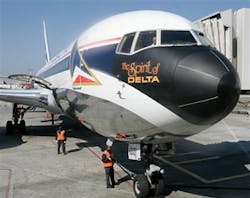'Spirit of Delta' Retires After Two Decades of Carrying Passengers
Delta Air Lines put a favorite old workhorse out to pasture Friday, after one last spin through the sky with former employees and other guests aboard.
"Spirit of Delta," a Boeing 767 that employees bought for the company in 1982 for $30 million, was formally retired Friday after more than two decades of carrying passengers.
A crowd of some 200 employees and retirees cheered the big jet's 11:05 a.m. arrival at Hartsfield-Jackson International from Dallas, one of several stops on a farewell tour of cities with a significant Delta presence. It rolled up to Gate B34 under showers from fire trucks --- the traditional welcome for a retiring pilot's last flight.
"Isn't that beautiful," said one woman among the dozens who lined airport windows for a better view.
The "Spirit" wore several paint jobs over the years, including a special 1996 Olympics color scheme and a retro silver-gray livery commemorating Delta's 75th anniversary in 2004. On Friday it bore the original '60s "widget" logo featuring a black nose and slanted Delta symbol on the tail.
"It has a soul," Delta CEO Gerald Grinstein said after the plane's arrival. "Although our creditors wanted it, we decided they would never get it." Normally, any assets an airline disposes of in Chapter 11 are subject to creditors' claims.
The 23-year-old jet was pulled off regular passenger flights last month --- the last of a group of older 767s the airline decided to retire as part of its restructuring.
After the ceremony, the jet took a final flight over Atlanta with employees, retirees and members of a charity group on board. It's headed next to a museum at Delta headquarters.
The 1982 fund drive became a corporate legend and a vivid illustration of the "family" culture Delta built during its first few decades in the air. According to the company, the idea came from three flight attendants. Many employees contributed 5 percent of pay through payroll deductions.
Two of the attendants were at Friday's ceremony.
"I'm glad it's going to stay with the company, rather than going out to the arid desert," said one, Ginny Oxford. Oxford, now 59 and retired after 33 years at Delta, said the idea arose after Delta was criticized for giving employees a raise while posting what at the time was its first annual loss in 36 years.
"We said, 'How can they say it's a mistake to give the employees a raise? We need to show them ... some support for the company,' " said Oxford, who lives in Madison. "Somebody in the room said, 'Buy an airplane.' "
After consulting management, the group got an office and set a goal of contributions from 80 percent of the work force, said Diane Carvelli, also 59 and one of the three attendants. She said they easily reached their goal.
"There were so many people that felt this was their airline," she said.
The jet arrived in December 1982 amid much fanfare. At the time, a 6-year-old named Adam Peppers rode on a tug that pulled the new plane into a Delta hangar. Legend has it he handed then-CEO Dave Garrett a quarter to help pay for the jet.
"Adam, do you have another quarter?" Grinstein asked Peppers, who attended Friday's retirement. Peppers produced another quarter for a laughing Grinstein.
Much has changed since the 1982 drive, with Delta growing larger but also enduring longer and deeper financial slumps in the early 1990s and again in this decade.
People at Friday's event acknowledged that broad support for such a gesture would be hard to generate now. Delta workers have endured repeated waves of job and pay cuts during the company's current crisis.
"The industry has fundamentally changed," Grinstein said after the event. "I think it's going to take five, six, seven years before that relationship is restored," he said, calling it "key" to Delta's survival.
Oxford and Carvelli, who both retired amid big job cuts in 2001, said they are thankful to have been part of a golden period at the airline.
"I don't think that corporations support employees the way they did at that time," said Oxford.
Added Carvelli, who now lives in Hawaii: "We were lucky."
Copyright 2005 LexisNexis, a division of Reed Elsevier Inc. All rights reserved.
Terms and Conditions | Privacy Policy
News stories provided by third parties are not edited by "Site Publication" staff. For suggestions and comments, please click the Contact link at the bottom of this page.

